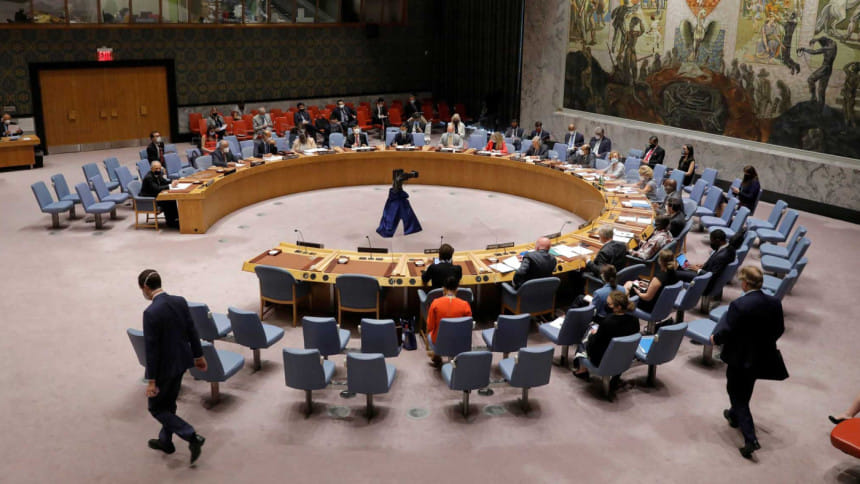Can the UN play a central role in reshaping Afghanistan’s future?

As the world debates on the ways to deal with the serious challenges faced on multiple fronts after the Taliban takeover of Afghanistan, one issue that has received much less attention than the others is the kind of template based on which the solutions are to be found. The challenges relate as much to Afghanistan's internal dynamics as to the external ones.
It is against this backdrop that one has to view the speech delivered by India's External Affairs Minister S Jaishankar at the United Nations high-level meeting on the humanitarian situation in Afghanistan on September 13. Jaishankar's remarks revolve around the UN Security Council's Resolution 2593, adopted on the final day of India's month-long leadership of the world body in August. The resolution is a strong reflection from the Security Council and the international community on its expectations regarding Afghanistan. It iterates the importance of combating terrorism in Afghanistan, including those individuals and entities designated pursuant to Resolution 1267 adopted by the Security Council in 1999, and asked the Taliban to facilitate safe passage for people wanting to leave Afghanistan, allow humanitarian operation in the country, uphold human rights—including for women and children—and an inclusive political settlement.
But where he departs from the UNSC resolution is his unambiguous suggestion for centrality of the United Nations' role in shaping the future of Afghanistan, and how this centrality is the best option in the current circumstances.
Jaishankar's main argument is that "a multilateral (UN) platform is always more effective than small groups in building global consensus and encouraging united action" in Afghanistan. It is in this context, he said, that the UN Security Council Resolution 2593 should guide the international community's approach in the coming days as Afghanistan goes through a critical phase.
The UNDP reckons that Afghanistan faces the threat of sliding further back into poverty—from 72 percent to 97 percent—which not only has serious consequences for that country, but will also have a severe impact on regional stability. As humanitarian aid is crucial, it is important to keep in mind that the issue of travelling and safe passage has the potential to emerge as an obstacle to delivering assistance, and it needs to be sorted out at the earliest. This, Jaishankar said, warrants the resumption of regular commercial flight operations at the Kabul airport to ensure regular flow of humanitarian aid to complement domestic relief measures.
Why is the central role for the UN needed in Afghanistan, from where the world body has been missing since the US-led international forces ousted the Taliban from power in 2002? This is mainly due to the lack of a viable regional grouping that could help Afghanistan, which is a member of both Saarc and the Shanghai Cooperation Organisation (SCO), a security group led by China and Russia.
The South Asian Association for Regional Cooperation (Saarc) is moribund and cannot be expected to do anything to assist Afghanistan. The SCO is a mechanism whose member-countries have differing perspectives and conflicting interests on Afghanistan—so much so that it makes Singapore-based Indian strategic affairs expert C Raja Mohan to comment in an article in The Indian Express: "It is unlikely that the SCO can come up with a regional solution for the Afghan crisis." Complicating the matter further is the divergences between the US and the European Union where Afghanistan is concerned. It remains to be seen how much the UN can be effective in bringing the world together on the Afghan issue.
But there are certain common things that can be easily agreed on by the international community to provide humanitarian assistance in Afghanistan by creating an enabling environment besides the need for an end to terrorism and radicalism in the country. This can have some salutary effects on the country's security situation. Efficient logistics, according to Jaishankar, is one such common issue for which unfettered and direct access to Afghanistan is required.
Another important thing that the Indian foreign minister points out is the non-discriminatory distribution of humanitarian assistance across all sections of Afghan society. Only the United Nations has the capacity to monitor humanitarian efforts and make assurances to the donor countries and organisations, Jaishankar contends.
The assessment in New Delhi is that, given the current situation in Afghanistan and Pakistan's ascendancy in that country, only the UN umbrella can provide a way out for India to resume its own efforts to meet the humanitarian requirements of the Afghans. India provided more than one million tonnes of wheat to Afghanistan over the past decade, and also partnered with the World Food Programme (WFP) for distribution of high protein biscuits for school-going children for several years. India is also keen to see its 500 development projects in all 34 provinces of Afghanistan remain intact. These projects—spanning power, water supply, road connectivity, healthcare, education, and agriculture sectors—have in the last two decades created the image of a soft-power country, which has never sought the role of a security provider in Afghanistan. As the former Indian envoy to Pakistan TCA Raghavan suggests, India should not wean itself away from Afghanistan just because of the changed situation in the country.
The UN's centrality on the Afghan issue can also help India regain some of the influence it has been enjoying in Afghanistan for the last two decades before the Taliban takeover.
The UN is often criticised for its inability to resolve conflict situations and humanitarian crises around the world. Afghanistan provides an opportunity for it to redeem itself.
Pallab Bhattacharya is a special correspondent for The Daily Star. He writes from New Delhi, India.

 For all latest news, follow The Daily Star's Google News channel.
For all latest news, follow The Daily Star's Google News channel. 



Comments